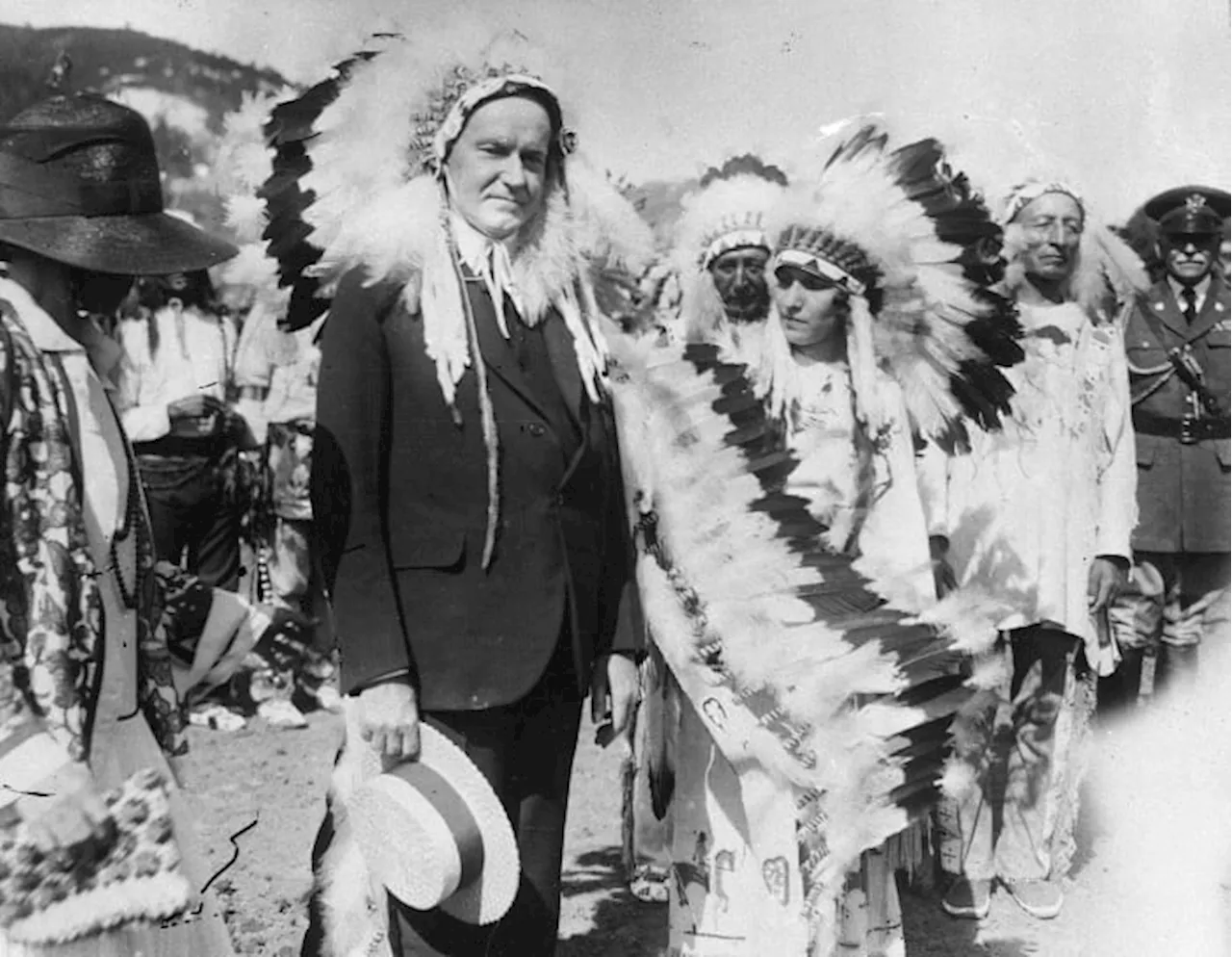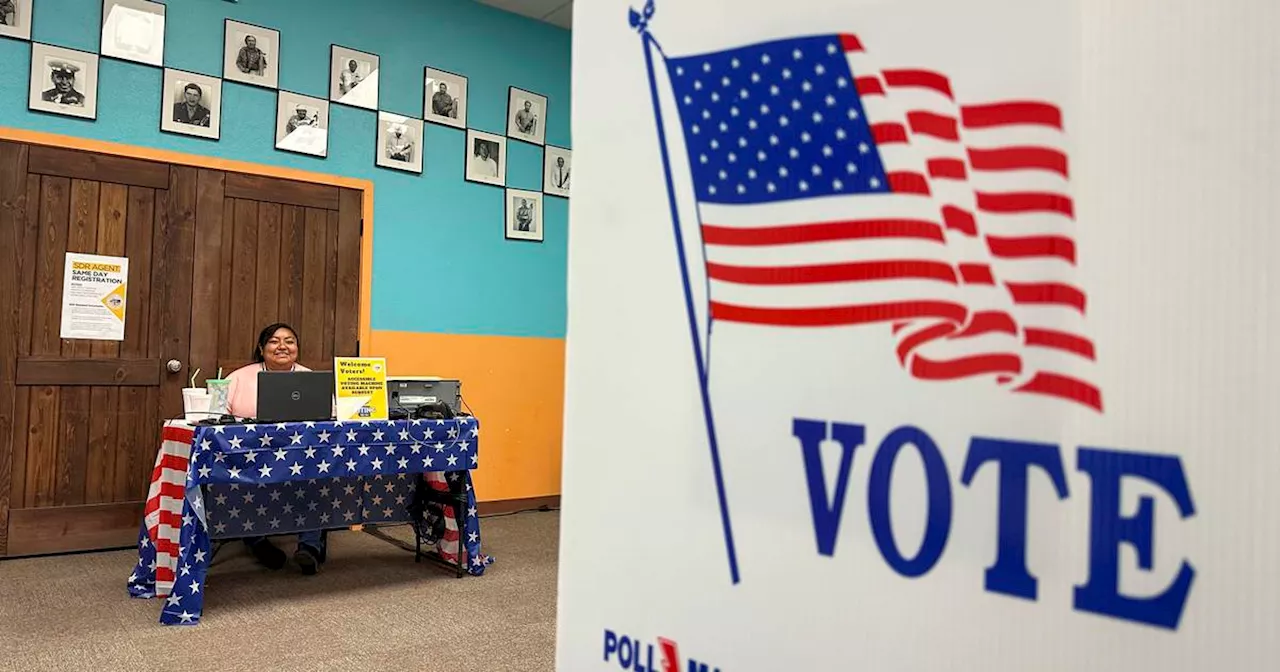In New Mexico, recent election reforms are promising tribal communities a greater voice in how and where they can vote — bolstering an already robust path to political power.
By Morgan Lee, Associated PressCecile Gachupin, who oversees the voting center located at tribal headquarters, waits for voters to arrive during the last day of early voting at Zia Pueblo, New Mexico, on Wednesday, May 22, 2024. An act of Congress a century ago granted U.S. citizenship to Native Americans, marking the start of a long, arduous journey to secure voting rights.
New Mexico is trying something new — a test run of sorts for many new and contested provisions that are part of the state’s Native American Voting Rights Act that was passed last year. The measure promises tribal communities a greater voice in how and where they can vote, even opening the possibility that tribal offices can be designated as a street address for remote households that have none.
It was by design, said Maurice Crandall, an Arizona State University history professor and citizen of the Yavapai-Apache Nation of Camp Verde. Pointing to the largest Native populations in New Mexico and Arizona, he said:"They don’t want a large group of Native people who can swing elections.” An exhibit at the New Mexico History Museum in Santa Fe, N.M., on Friday, May 17, 2024, recounts the life and times of voting rights pioneer Miguel Trujillo of Isleta Pueblo, who in 1948 successfully challenged New Mexico’s ban on voting by Native Americans. An act of Congress a century ago guaranteed citizenship to Native Americans but was only the outset of an arduous journey to secure voting rights in many states.
In Arizona, the anniversary of the Indian Citizenship Act stirs up frustration among Native American leaders, including Gov. Stephen Lewis of the Gila River Indian Community. He has denounced efforts by the Republican National Committee and state lawmakers to revive and extend voter ID requirements through the 2024 general election.
Native Americans have held widely divergent views about citizenship and voting, said Torey Dolan, a research fellow at the University of Wisconsin Law School and citizen of the Choctaw Nation of Oklahoma. Some view U.S. citizenship as incompatible with being Indigenous people; others see it more like dual citizenship.
United States Latest News, United States Headlines
Similar News:You can also read news stories similar to this one that we have collected from other news sources.
 100 years ago, US citizenship for Native Americans came without voting rights in swing statesAn act of Congress a century ago guaranteed citizenship to wary Native Americans in an age of forced assimilation and marked the outset of a long, arduous journey to secure voting rights that were denied for several more decades.
100 years ago, US citizenship for Native Americans came without voting rights in swing statesAn act of Congress a century ago guaranteed citizenship to wary Native Americans in an age of forced assimilation and marked the outset of a long, arduous journey to secure voting rights that were denied for several more decades.
Read more »
 100 years ago, US citizenship for Native Americans came without voting rights in swing statesAn act of Congress a century ago guaranteed citizenship to wary Native Americans in an age of forced assimilation and marked the outset of a long, arduous journey to secure voting rights that were denied for several more decades
100 years ago, US citizenship for Native Americans came without voting rights in swing statesAn act of Congress a century ago guaranteed citizenship to wary Native Americans in an age of forced assimilation and marked the outset of a long, arduous journey to secure voting rights that were denied for several more decades
Read more »
 100 years ago, US citizenship for Native Americans came without voting rights in swing statesAn act of Congress a century ago guaranteed citizenship to wary Native Americans in an age of forced assimilation and marked the outset of a long, arduous journey to secure voting rights that were denied for several more decades.
100 years ago, US citizenship for Native Americans came without voting rights in swing statesAn act of Congress a century ago guaranteed citizenship to wary Native Americans in an age of forced assimilation and marked the outset of a long, arduous journey to secure voting rights that were denied for several more decades.
Read more »
 100 years ago, US citizenship for Native Americans came without voting rights in swing statesAn act of Congress a century ago guaranteed citizenship to wary Native Americans in an age of forced assimilation and marked the outset of a long, arduous journey to secure voting rights that were denied for several more decades.
100 years ago, US citizenship for Native Americans came without voting rights in swing statesAn act of Congress a century ago guaranteed citizenship to wary Native Americans in an age of forced assimilation and marked the outset of a long, arduous journey to secure voting rights that were denied for several more decades.
Read more »
 100 years ago, US citizenship for Native Americans came without voting rights in swing statesAn act of Congress a century ago guaranteed citizenship to wary Native Americans in an age of forced assimilation and marked the outset of a long, arduous journey to secure voting rights that were denied for several more decades.
100 years ago, US citizenship for Native Americans came without voting rights in swing statesAn act of Congress a century ago guaranteed citizenship to wary Native Americans in an age of forced assimilation and marked the outset of a long, arduous journey to secure voting rights that were denied for several more decades.
Read more »
 100 years ago, US citizenship for Native Americans came without voting rights in swing statesThat legislation took shape in the aftermath of World War I in which thousands of Native Americans had volunteered to serve overseas in the military.
100 years ago, US citizenship for Native Americans came without voting rights in swing statesThat legislation took shape in the aftermath of World War I in which thousands of Native Americans had volunteered to serve overseas in the military.
Read more »
